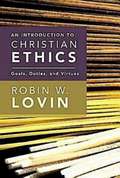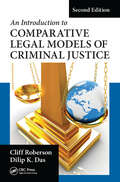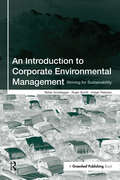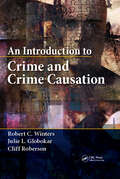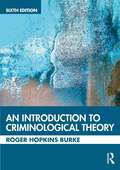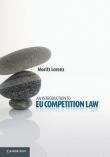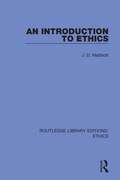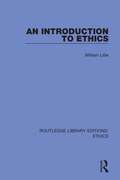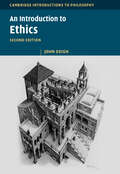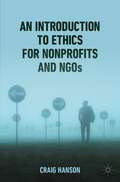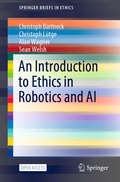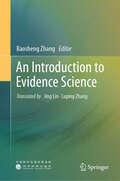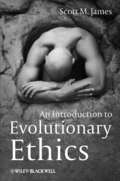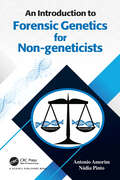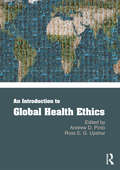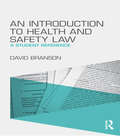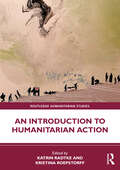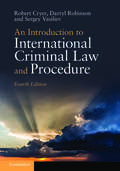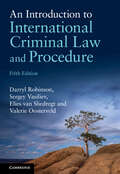- Table View
- List View
An Introduction to Christian Ethics: Goals, Duties, and Virtues
by Robin W. LovinA few years ago, the first distinction that ethicists drew was the line between Christian ethics and philosophical ethics. However, in our global context, Christian ethicists must now, in addition, compare and contrast various ethics. Christian ethics has become increasingly multivocal not only because of a plurality of faiths but also because of a plurality of Christianities. In light of these new realities, this book will introduce Christian ethics. It will lay out history, methods, and basic principles every student must know. The author also will include case studies for further explanation and application.
An Introduction to Comparative Legal Models of Criminal Justice
by Cliff Roberson Dilip K. DasUpdated to reflect changes in the criminal justice systems in several countries, An Introduction to Comparative Legal Models of Criminal Justice, Second Edition explores and illustrates the idea that a country‘s legal model determines the character of its police, corrections, and legal system. It focuses on how law shapes policing, including how it
An Introduction to Corporate Environmental Management: Striving for Sustainability
by Stefan Schaltegger Roger Burritt Holger PetersenThis book is designed to meet the urgent need for a comprehensive and definitive introduction and teaching text on corporate environmental management. It aims to become the standard textbook for courses examining how business can take the environment into account while also providing an accessible and thorough overview of this increasingly multidisciplinary subject for practitioners.Written by the internationally acknowledged experts Stefan Schaltegger and Roger Burritt (authors of the highly influential Contemporary Environmental Accounting) along with Holger Petersen, the book invites the reader to join in an exploration of the ways in which companies can engage in environmental management and why such engagement can be profitable for business. The reader is invited to: examine whether the contents reflect their own experience, takes their experience further, or opposes their own views; note which of the ideas presented are especially important, add to those ideas, or encourage a reaction (positive or negative); answer questions creatively (based on their own perspective of the issues); encourage themselves to be inspired by questions, which can be investigated further through other written sources of information, such as books you will be guided to through the bibliography, the Internet or the general media; and think about and plan the ways in which the knowledge provided can be implemented in your own situation.The book is organised into four main sections. First, the fundamental ideas and linkages behind business management, the environment and sustainable development are briefly but clearly sketched. The second part of the book outlines the criteria against which environmentally oriented business management can be assessed and the fields of action in which success can be achieved. The third part presents a discussion and examples of strategies for environmental management, which are linked, in the fourth part, to the essential tools of environmental management, especially green marketing, environmental accounting and eco-control.The book is full of case studies and examples related to the main contents of each chapter and each chapter provides a number of questions for the student or reader to address.An Introduction to Corporate Environmental Management is both a textbook and a sourcebook. The reader can either work through the material in a structured way or dip into the content and follow up on specific areas of interest. The materials are designed to be used for understanding and reference, rather than to be learned by heart. The primary aim is for the reader to obtain a practical understanding of the relationship between management and environmental issues which can be applied in day-to-day situations-whether as part of a student's wider view of management or within the practitioner's real-world situation. It will be essential reading for many years to come.
An Introduction to Crime and Crime Causation
by Cliff Roberson Robert C. Winters Julie L. GlobokarAn Introduction to Crime and Crime Causation is a student-friendly textbook that defines and explains the concepts of crime, criminal law, and criminology. Ideal for a one-semester course, the book compares and contrasts early criminal behavior and today‘s modern forms of crime. It also explores society‘s responses to criminal behavior in the past
An Introduction to Criminological Theory
by Roger Hopkins BurkeThis book provides a comprehensive and up-to-date introduction to criminological theory for students taking courses in criminology at both undergraduate and postgraduate level. Building on previous editions and the previous companion text, this book presents the latest research and theoretical developments in a socio-political context.All major theoretical perspectives are considered, including: classical criminology, biological and psychological positivism, labelling theories, feminist criminology, critical criminology and left realism, situation action theories, desistance theories, social control theories, the risk society, postmodern condition, and terrorism. The new edition has been updated and revised over seven parts to include full chapters on key topics, such as Bourdieau and criminology, narrative criminology, cultural victimology, southern theory and criminology, green and species criminology, critical race theory, convict and abolitionist and convict criminologies, and ultra-realist criminology. These key issues are discussed in the context of debates about the fragmentation of modernity and the postmodern condition: the rise of political populism, risk, surveillance and social control, conspiracy theories, post-truth society and speculation about living in post–COVID-19 society, and the future of neoliberalism.Supplemented with chapter summaries, critical thinking questions, policy implications, a full glossary of terms and theories, and a timeline of criminological theory, this book will appeal to undergraduate and postgraduate students of criminology, sociology, and politics, and is essential reading for advanced students of criminology looking for a way to engage with contemporary themes and concepts in theory.
An Introduction to EU Competition Law
by Moritz Lorenz Julia DietrichSuccinct and concise, this textbook covers all the procedural and substantive aspects of EU competition law. It explores primary and secondary law through the prism of ECJ case law. Abuse of a dominant position and merger control are discussed and a separate chapter on cartels ensures the student receives the broadest possible perspective on the subject. In addition, the book's consistent structure aids understanding: section summaries underline key principles, questions reinforce learning and essay discussion topics encourage further exploration. By setting out the economic principles which underpin the subject, the author allows the student to engage with the complexity of competition law with confidence. Integrated examples and an uncluttered writing style make this required reading for all students of the subject.
An Introduction to Ethics
by J. D. MabbottOriginally published in 1966, this introduction to moral philosophy examines the philosophical basis of moral problems and considers some of the crucial arguments that attempt to define or dispense with a moral justification of events. Some of the questions discussed are whether moral rules are justified and whether there is any positive evidence that man has free will.
An Introduction to Ethics
by William LillieOriginally published in 1948, and reprinted in 1955 and updated in 1961, this book is a straightforward account of moral philosophy for students. It discusses comprehensively the contributions made by 20th Century moralists, both in terms of the interpretation of their predecessors and original ethical speculation.
An Introduction to Ethics (Cambridge Introductions to Philosophy)
by John DeighNow in an expanded and revised second edition, this book offers clear, penetrating examination of the central questions of ethics through study of the most important ethical theories in Western philosophy. Readers are introduced not only to the main ideas of each theory but also to contemporary developments and defenses of those ideas. Among theories the book covers are egoism, the eudaimonism of Plato and Aristotle, act and rule utilitarianism, modern natural law theory, Kant's moral theory, and existentialist ethics. Two new chapters add to this coverage expositions of Hume's ethics, Sidgwick's program for defending utilitarianism, and Rawls's hypothetical contractarianism. The discussions throughout draw the reader into philosophical inquiry through argument and criticism that illuminate the profundity of the questions under examination. Students will find this book to be a helpful guide to how philosophical inquiry is undertaken as well as to what the major theories of ethics hold.
An Introduction to Ethics for Nonprofits and NGOs
by Craig HansonThis textbook explores ethical issues for not-for-profit and non-governmental organizations, providing discussion-oriented cases for NFP and NGP practitioners. The book begins with an introduction to professional ethics as practiced in industry, not-for-profits and NGO’s. Attention is paid both to classical ethical theories and contemporary variants. Then, combining that theory with an introduction to the morally unique facets of the NFP and NGO landscape, it offers a series of cases which pertain to the underlying theoretical substrate. The reader will find a blend of theory and application within the text as well as guided assignment prompts. Themes covered include board relationships, staff management, work with vulnerable populations, financial transparency, Human Resources ethics and ethical dilemmas unique to international operations.
An Introduction to Ethics in Robotics and AI (SpringerBriefs in Ethics)
by Alan Wagner Christoph Lütge Sean Welsh Christoph BartneckThis open access book introduces the reader to the foundations of AI and ethics. It discusses issues of trust, responsibility, liability, privacy and risk. It focuses on the interaction between people and the AI systems and Robotics they use. Designed to be accessible for a broad audience, reading this book does not require prerequisite technical, legal or philosophical expertise. Throughout, the authors use examples to illustrate the issues at hand and conclude the book with a discussion on the application areas of AI and Robotics, in particular autonomous vehicles, automatic weapon systems and biased algorithms. A list of questions and further readings is also included for students willing to explore the topic further.
An Introduction to European Law
by Robert SchützeThought-provoking and accessible in approach, this book offers a classic introduction to European law. Taking a clear structural framework, it guides the student through the subject's core elements from its creation and enforcement to the workings of the internal market. A flowing writing style combines with the use of illustrations and diagrams throughout the text to ensure the student understands even the most complex of concepts. This succinct and enlightening overview is required reading for all students of European law. Clearly sets out the key principles and central topics taught on EU law courses. Succinct overview which also indicates key debates and controversies in the field. Numerous illustrations reinforce key concepts to aid understanding.
An Introduction to Evidence Science
by Baosheng ZhangThe book discusses the subject and scope of evidence science and puts forward the new epistemological formula of "practice-evidence-knowledge-evidence-practice", which applies to the problem of evidence reasoning and knowledge acquisition that exist in different disciplines. Also, it demonstrates the history of evidence science and reveal the formation, development and maturing process of the traditional evidence theory, as well as the ideological origin and characteristics; clarifies the probabilistic path of judicial proof by probability theory of evidence. It introduces the theory of evidential reasoning, discusses the concept, nature and function the evidential reasoning through chart method, narrative method, the mixed methods and argumentation and story. It puts forward the basic principle in seeking for the truth through evidence-based decision-making. The game-theory rules and models are introduced, as well as the influencing factors of evidence-based decision-making such as fact, evidence, law and claims. It discusses the issues of evidential evaluation in both the general context and legal context, taking the decision-making activities as the frame of reference; discusses the trend of interdisciplinary development of narratology and the resulting “narrative turn” in evidence science through reviewing general theory of narratology. The book introduces the theory of evidential explanation. It analyses the relationships among fact, evidence and explanation from the perspective of hermeneutics; and theory of scientific evidence, discuss the effects of scientific evidence in judicial fact-finding. This book is the research results of the "Evidence Science Theory System and Applied Research" project, which established in 2006 and, after 13 years, has taken a significant first step in the field of a broadly defined evidence science on the basis of a less expansive research endeavor aimed at integrating evidence law and forensic science.
An Introduction to Evolutionary Ethics
by Scott M. JamesOffering the first general introductory text to this subject, the timely Introduction to Evolutionary Ethics reflects the most up-to-date research and current issues being debated in both psychology and philosophy. The book presents students to the areas of cognitive psychology, normative ethics, and metaethics. The first general introduction to evolutionary ethics Provides a comprehensive survey of work in three distinct areas of research: cognitive psychology, normative ethics, and metaethics Presents the most up-to-date research available in both psychology and philosophy Written in an engaging and accessible style for undergraduates and the interested general reader Discusses the evolution of morality, broadening its relevance to those studying psychology
An Introduction to Forensic Genetics for Non-geneticists
by Antonio Amorim Nádia PintoThis book aims to enable non-experts in Genetics to understand the contribution of this science to resolve civil or criminal litigations, analysing evidence of human and non-human origins. The main difficulties in the comprehension and misuse of the results of Forensic Genetics reside in the lack of effective communication between geneticists and the users of the produced information (as lawyers and judges) and do not arise primarily from the lack of knowledge of genetics. Therefore, instead of a classical handbook we use a question-and-answer approach, which meets this interfacial essence. Questions that can be addressed by genetic expertise are typified and for each of them we provide the possible expert report, presenting the essential biological and statistical genetics background in the form of boxes/appendices, along with exemplary cases. Legal, ethical, and theoretical limitations of Forensic Genetics are discussed, formulating questions that cannot, or should not, be addressed by this applied science.
An Introduction to Global Health Ethics
by Andrew D. Pinto Ross E. UpshurThe field of global health is expanding rapidly. An increasing number of trainees are studying and working with marginalized populations, often within low and middle-income countries. Such endeavours are beset by ethical dilemmas: mitigating power differentials, addressing cultural differences in how health and illness are viewed, and obtaining individual and community consent in research. This introductory textbook supports students to understand and work through key areas of concern, assisting them in moving towards a more critical view of global health practise. Divided into two sections covering the theory and practice of global health ethics, the text begins by looking at definitions of global health and the field’s historical context. It draws on anti-colonial perspectives concepts, developing social justice and solidarity as key principles to guide students. The second part focuses on ethical challenges students may face in clinical experiences or research. Topics such as working with indigenous communities, the politics of global health governance, and the ethical challenges of advocacy are explored using a case study approach. An Introduction to Global Health Ethics includes recommended resources and further readings, and is ideal for students from a range of disciplines – including public health, medicine, nursing, law and development studies – who are undertaking undergraduate and graduate courses in ethics or placements overseas.
An Introduction to Health and Safety Law: A Student Reference
by David BransonAn Introduction to Health and Safety Law provides a clear, concise overview of health and safety law in the United Kingdom. With reference to the European Union, this book discusses criminal and civil liability at length to provide a clear understanding of this area of law which has been subject to change over the 20 years. Key case studies and statistical information on prosecutions, fines and enforcement notices help to contextualise health and safety law to provide students and professionals with a full understanding of health and safety law in the UK. This book includes chapters on: the legal framework criminal liability enforcement of criminal liability civil liability civil remedy subordinate legislation. This book is an essential reference for students studying towards NEBOSH qualifications and students studying at university level. It provides a comprehensive understanding of UK health and safety law and will be a useful reference when entering the professional field.
An Introduction to Humanitarian Action (Routledge Humanitarian Studies)
by Kristina Roepstorff Katrin RadtkeThis important new textbook provides a concise and practice-oriented introduction to the workings of the humanitarian sector and the key contemporary debates surrounding it.The number of people around the world in need of humanitarian action and protection is at its highest figure in decades; yet at the same time, the humanitarian system is facing numerous problems and undergoing fundamental reforms. This book invites us to tackle these challenges head on, addressing the increasing complexity of humanitarian crises and the implications for humanitarian principles and standards as well as the management of humanitarian projects. Expansive in scope, the book covers: The sector’s historical foundations and the need to decolonise The main types of crises and sectors of humanitarian response State and non-state actors and institutions The key rules, norms, and project management approaches Key trends and challenges, including access, innovation, and anticipation The book also covers important debates on localisation, inclusive programming, and the decolonisation of the humanitarian system. This exciting new textbook will be an important read for students looking for a comprehensive introduction, as well as for practitioners wanting to stimulate critical thinking and enhance their practical skills.
An Introduction to International Arbitration
by Ilias BantekasThis concise yet comprehensive textbook introduces the reader to the law and practice of international arbitration. Arbitration is a complex field due to the variety of disciplines involved and necessitates an approach that takes nothing for granted. Written by a renowned scholar and practitioner, this book explains the divergent issues of civil procedure, contracts, conflict of laws, international law amongst others in an accessible manner. Focusing mainly on international commercial arbitration, the book also features a distinct chapter on consumer and online arbitration and an equally comprehensive chapter on international investment arbitration.
An Introduction to International Criminal Law and Procedure
by Robert Cryer Håkan Friman Darryl Robinson Elizabeth Wilmshurst Robert Cryer Håkan Friman Darryl RobinsonThis market-leading textbook gives an authoritative account of international criminal law, and focuses on what the student needs to know - the crimes that are dealt with by international courts and tribunals as well as the procedures that police the investigation and prosecution of those crimes. The reader is guided through controversies with an accessible, yet sophisticated approach by the author team of four international lawyers, with experience both of teaching the subject, and as negotiators at the foundation of the International Criminal Court and the Rome conference. It is an invaluable introduction for all students of international criminal law and international relations, and now covers developments in the ICC, victims' rights, and alternatives to international criminal justice, as well as including extended coverage of terrorism. Short, well chosen excerpts allow students to familiarise themselves with primary material from a wide range of sources. An extensive package of online resources is also available.
An Introduction to International Criminal Law and Procedure
by Robert Cryer Håkan Friman Darryl Robinson Elizabeth Wilmshurst Robert Cryer Håkan Friman Darryl RobinsonThis market-leading textbook gives an authoritative account of international criminal law, and focuses on what the student needs to know - the crimes that are dealt with by international courts and tribunals as well as the procedures that police the investigation and prosecution of those crimes. The reader is guided through controversies with an accessible, yet sophisticated approach by the author team of four international lawyers, with experience both of teaching the subject, and as negotiators at the foundation of the International Criminal Court and the Rome conference. It is an invaluable introduction for all students of international criminal law and international relations, and now covers developments in the ICC, victims' rights, and alternatives to international criminal justice, as well as including extended coverage of terrorism. Short, well chosen excerpts allow students to familiarise themselves with primary material from a wide range of sources. An extensive package of online resources is also available.
An Introduction to International Criminal Law and Procedure
by Robert Cryer Darryl Robinson Sergey VasilievWritten by a team of international lawyers with extensive academic and practical experience of international criminal law, the fourth edition of this leading textbook offers readers comprehensive coverage and a high level of academic rigour while maintaining its signature accessible and engaging style. Introducing the readers to the fundamental concepts of international criminal law, as well as the domestic and international institutions that enforce that law, this book engages with critical questions, political and moral challenges, and alternatives to international justice. Suitable for undergraduate and postgraduate students, academics and practitioners in the field, and cited by the International Criminal Tribunal for Yugoslavia, the International Criminal Court, the Special Court for Sierra Leone, the Extraordinary Chambers in the Courts of Cambodia, and the highest courts in domestic systems, this book is a must-read for anyone interested in learning more about international criminal law.
An Introduction to International Criminal Law and Procedure
by Darryl Robinson Sergey Vasiliev Valerie Oosterveld Elies van SliedregtBuilding on the success of previous editions (Cryer et al.), this popular textbook is now expanded and updated in a 5th edition featuring two new co-authors, Elies van Sliedregt and Valerie Oosterveld. A market leader and one of the most globally trusted textbooks on international criminal law, it is known for its accessible and engaging tone and for an even-handed approach that is both critical and constructive. Comprehensively updated and rewritten, this new edition introduces readers to the main concepts of international criminal law, as well as the domestic and international institutions that enforce it, and addresses the latest challenges and controversies surrounding the International Criminal Court. Written by a team of international criminal lawyers who have extensive academic and practical experience in the field, the book engages with critical questions, political and moral challenges, and alternatives to international justice. It contains helpful references to other literature, making it a valuable research resource.
An Introduction to International Institutional Law
by Jan KlabbersInternational institutions are powerful players on the world stage, and every student of international law requires a clear understanding of the forces that shape them. For example, with increasing global influence comes the need for internal control and accountability. This thought-provoking overview considers these and other forces that govern international institutions such as the UN, EU and WTO, and the complex relationship that exists between international organizations and their member states. Covering recent scholarly developments, such as the rise of constitutionalism and global administrative law, and analysing the impact of important cases, such as the ICJ's Genocide case (2007) and the Behrami judgment of the European Court of Human Rights (2007), its clarity of explanation and analytical approach allow students to understand and think critically about a complex subject.
An Introduction to International Investment Law
by David CollinsThis insightful and accessible introduction provides students and practitioners with a comprehensive overview of the increasingly important discipline of international investment law. Focusing primarily on the legal principles contained in the growing body of international investment agreements, this book covers the core concepts of the discipline with attention given to their relation to each other and to the manner in which they have been developed through arbitration case law. The context of each legal principle is explored along with a consideration of some of the major debates and emerging criticisms. Avoiding extensive case extracts, this book adopts an engaging and succinct narrative style which allows readers to advance their understanding of the topic while examining the legal principles with academic rigour and discerning commentary.
